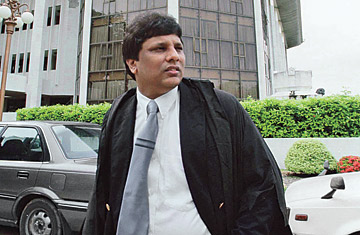
Contrarian Wickrematunge took on government corruption.
In the last editorial that he wrote, Lasantha Wickrematunge lamented the loss of Sri Lanka's independent voices. "Much of the media has been bought, or cajoled and bullied into silence. Dozens of journalists are dead and others have been incarcerated without trial for months," he wrote in the Jan. 4 issue of his paper, the Sunday Leader. "Who then survives to provide the public with a contrarian view?"
Wickrematunge, 50, was one of this war-ravaged country's brave contrarians. For the past 14 years, his paper published cheeky editorials and outrageous exposés alleging corruption and self-dealing among politicians of every party and was openly critical of a government that demanded absolute loyalty from the media. On Jan. 8, he joined the long list of the silenced. He was driving to work when two men on motorcycles swerved in front of his car to block its path. Two others pulled up on either side, smashed the car's windows and shot him. Wickrematunge died of his injuries a few hours later. The four masked gunmen disappeared. (See pictures of Sri Lanka.)
His death is a personal loss to TIME. Wickrematunge had been a freelance reporter for us since 2002, and I am the third South Asia bureau chief to benefit from his patient and perceptive explanations of Sri Lanka's complex history and politics. For 25 years, its government has been fighting a brutal armed separatist movement, the Liberation Tigers of Tamil Eelam (LTTE), in a conflict that has claimed more than 65,000 lives. The Tigers, who pioneered the use of suicide bombers, are agitating for a separate homeland for Sri Lanka's ethnic Tamils--a response to decades of suppression of the country's largest minority. A cease-fire agreement signed in 2002 raised hopes that the bombings, assassinations and terrorism had finally come to an end. But the Tigers and the government failed to reach a meaningful political compromise and returned to war. President Mahinda Rajapaksa has promised a "military solution" to the Tamil question. He is almost there. After months of intense fighting in the LTTE-controlled areas of the Tamil-majority north, the army has captured Kilinochchi, the rebels' administrative capital, and it is moving toward their last strongholds in the jungles around Mullaitivu.
Yet few Sri Lankan journalists have been permitted to report on these successes--or on their human toll. The war zone is all but off-limits to the media, one of the many security measures imposed by a government with little tolerance for dissent. "I ask this of all political parties, all media and all people's organizations," Rajapaksa said in a speech in 2006. "You decide whether you should be with a handful of terrorists or with the common man ... You must clearly choose between these two sides."
Wickrematunge could not accept that kind of thinking. Even a wartime government, he believed, ought to be held accountable to its citizens. Stories in the Sunday Leader raised questions about who benefited from military aircraft contracts, needled Sri Lankan Cabinet officials for extravagant trips abroad and, in one infamous exclusive, accused the Defense Minister of arranging false travel documents for a former LTTE leader who is now part of the government. The Defense Ministry has denied any involvement.
After the government's triumph in Kilinochchi, Wickrematunge feared that his enemies might feel emboldened to carry out the threats he had been receiving for months. "He felt the euphoria was at a high, and he felt vulnerable," his brother Lal told me.
There is no clear evidence pointing to whoever is responsible for his murder, and many observers in Sri Lanka fear that there never will be. "One of the problems for many years has been the problem of impunity," says Robert Blake, the U.S. ambassador to Sri Lanka. "They always say that they're going to investigate these things, but nothing ever happens." The U.S. State Department has condemned the murder and called for a Sri Lankan government probe, adding to a chorus of similar requests from human-rights groups and other nations.
Three days after the murder, the Sunday Leader published an editorial written as if by Wickrematunge's spirit: "I hope my assassination will be seen not as a defeat of freedom but an inspiration for those who survive to step up their efforts." His mourners took up that call to action and turned his funeral procession into a mass protest through the streets of Colombo. The pen is powerful, but sometimes it isn't enough.
